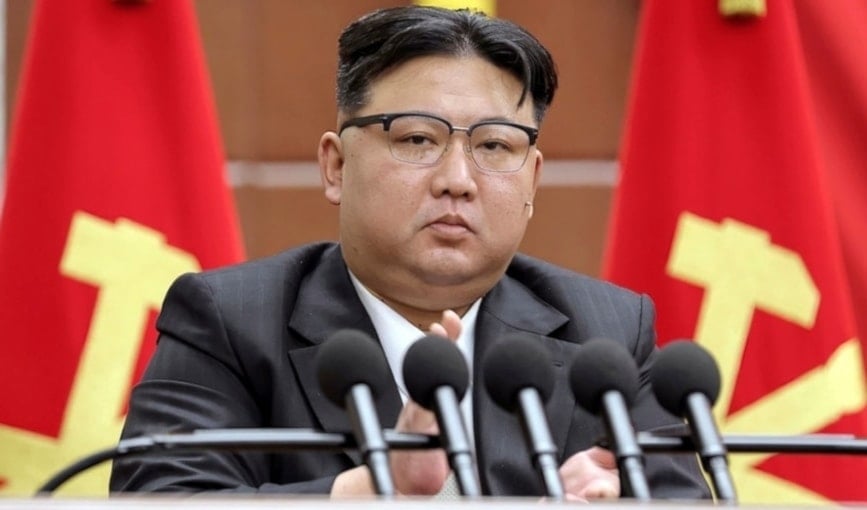Kim Jong Un warns of inevitable military clash on Korean peninsula
Speaking at a significant military gathering, DPRK leader Kim Jong Un highlighted the growing risk of conflict on the Korean Peninsula, emphasizing the urgency of equipping the army with modern capabilities.
-

In this photo provided by the DPRK government, DPRK leader Kim Jong Un delivers a speech during a year-end plenary meeting of the Workers’ Party, which was held between December 26-30, 2023, in Pyongyang, DPRK. (AP)
DPRK leader Kim Jong Un declared that the likelihood of a military conflict on the Korean Peninsula is becoming increasingly apparent. Addressing the 4th meeting of battalion commanders and political instructors—held for the first time in a decade—Kim emphasized the necessity of preparing for war as a top priority, calling for the army's technical and ideological modernization, according to the Korean Central News Agency (KCNA).
In his policy speech titled "On the Current Situation and Tasks of Battalion Commanders and Political Leaders of the Korean People's Army" delivered on November 15, Kim underscored the significance of battalions in the military structure. Although they represent "the lowest level in the military command system," he said, the party places them in a central position, valuing the contributions of soldiers.
Reflecting on the progress since the previous meeting held ten years ago, Kim noted that the main mission of the revolutionary army remains preparing for a possible war.
"This sacred mission cannot be transferred to anyone else. Only through the constant readiness of our armed forces can we guarantee lasting peace and the steady progress of socialist construction," he stressed.
Kim acknowledged weaknesses in the combat readiness of battalions and emphasized that addressing these gaps is crucial. He described combat training as a "priority revolutionary task," particularly given the volatile regional situation involving the United States, "South Korean puppets," and other forces engaging in "provocative war games."
"Just as frequent as clouds foretell rain, and thick thunderclouds foretell lightning, so the inevitability of a military clash on our soil is becoming obvious," he warned.
Kim Jong Un urges expansion of nuclear forces in response to US threats
The DPRK leader advocated for an "innovative approach" to military training to align with modern warfare trends. He called for strengthening all posts, maintaining combat alerts, and ensuring readiness to suppress enemy provocations instantly. Highlighting the role of modernization, Kim stressed, "Modern warfare proves that a technically outdated army cannot defeat an enemy armed from head to toe."
Elsewhere in his remarks, he reiterated his demand for an “unlimited” expansion of the country’s military nuclear program in response to US-led threats, marking his first direct criticism of Washington since Donald Trump’s election win.
Kim condemned the United States for updating its nuclear deterrence strategies in collaboration with South Korea and strengthening three-way military ties with Japan, which he described as an "Asian NATO". He argued that this alliance was contributing to rising tensions and instability in the region.
He also criticized the US for its support of Ukraine amid its war with Russia, arguing that Washington and its Western allies were using Ukraine as their “shock troops” in a war against Moscow, aiming to expand US military influence.
In recent months, the DPRK leader has focused on strengthening his country's relationship with Russia, endorsing the concept of a "new Cold War" and showing solidarity with Russian President Vladimir Putin in his broader struggles against the West.
He concluded by urging the integration of political and ideological fortification with military and technical advancements to bolster the armed forces and ensure readiness for war.
DPRK ratifies defense treaty with Russia
The Democratic People's Republic of Korea (DPRK) ratified a landmark defense pact with Russia, deepening security cooperation, state media reported on November 12.
The agreement formalizes months of tightening military bonds between the two nations.
The Korean Central News Agency (KCNA) reported that the deal "was ratified as a decree" of leader Kim Jong Un. The notice came after Russian lawmakers voted unanimously last week to ratify the deal.
"The treaty will take effect from the day when both sides exchanged the ratification instruments," KCNA said.
On his part, Putin officially ratified the comprehensive strategic partnership agreement on November 10, strengthening military and political ties with the heavily sanctioned state amid growing international tensions.
The treaty, initially signed by Putin and DPRK leader Kim Jong-un during Putin's visit to Pyongyang in June, includes mutual pledges of defense and a commitment to oppose Western sanctions.
The agreement committed both countries to provide "immediate" military assistance in the event of an attack on either side and to collaborate internationally in opposing Western sanctions.
Putin hailed the deal in June as a "breakthrough document".
He added, “The document on comprehensive partnership that we signed today provides, among other things, for mutual aid in case of aggression against one of the participants."
Putin stated that Moscow supports Pyongyang’s right to protect its security and sovereignty from potential Western aggression. He also attributed the rising tensions in the region to the actions of the US and its allies.

 5 Min Read
5 Min Read








